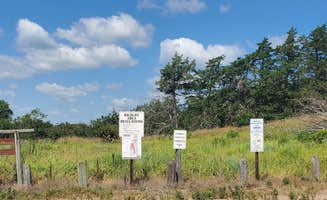Dispersed camping near Fairbury, Nebraska offers a range of primitive campsites within a 25-mile radius of this southeastern Nebraska town. The area sits at approximately 1,300 feet elevation in the rolling plains of Jefferson County, where summer temperatures frequently exceed 90°F between June and August. Winter camping remains possible but challenging as temperatures can drop below freezing from November through March with occasional snow accumulation that may temporarily affect access roads.
What to do
Fishing opportunities: Smiths Creek Recreational Area provides lakeside fishing access for overnight campers. Visitors can fish from shore or bring small watercraft. "Very pretty, clean toilets, potable water, has picnic tables and grills," notes Maya H., who appreciated the amenities that support day activities.
Morning bird watching: Early risers can enjoy diverse bird species, particularly during spring and fall migrations. "Woke up to cheery birdsong," reports Anna P., highlighting the natural soundtrack that accompanies morning coffee at Smiths Creek.
Playground access: Families staying at primitive sites can take advantage of playground facilities. One camper mentioned, "A few people came and went to fish or play at the park," indicating recreational options beyond just overnight stays.
What campers like
Quick interstate access: Yankee Hill Wildlife Management Area offers convenient camping for cross-country travelers. Travis A. notes it's "situated in the middle of corn fields" with "Lincoln Nebraska only 17 miles away," making it practical for supply runs.
Clean facilities: Despite the primitive nature, campers consistently mention facility upkeep. "The parking area is clean. There is a dumpster and vault toilet," reports Travis A., though he suggests campers inspect facilities themselves before settling in.
Spacious parking: The open layout accommodates various vehicle sizes. Rick M. explains, "The sites aren't technically sites. They're just little places off the side of the road that you can park. So just find a spot park there and you're good to go," offering flexibility for different camping setups.
What you should know
Stay limits: Different properties enforce different duration rules. "The state is 14 days," mentions Rick M. about Smiths Creek, while another camper notes Yankee Hill has "a three-day limit in a six-day period," requiring campers to plan accordingly.
Road conditions: Access roads can present challenges depending on weather and season. "The dirt road coming in is a bit slippery when wet. We slid all over the road, but there's no potholes," shares one camper about Smiths Creek Recreational Area.
Wildlife management rules: Some areas have specific regulations like no open fires. Tim O. points out, "No open fires" at Yankee Hill, a critical safety rule during dry conditions common in Nebraska summers.
Tips for camping with families
Mosquito preparation: Bring adequate insect repellent, especially during warmer months. "The WMA has a large marshy, stagnant pond, so bring mosquito repellent," advises Travis A., highlighting a preparation step easily overlooked.
Morning activities: Plan for early day experiences when temperatures are cooler. One visitor recommends to "enjoy lake in the morning," suggesting families take advantage of comfortable morning conditions before midday heat.
Water supply planning: While Smiths Creek Recreational Area provides potable water, other areas do not. Brittany M., who stayed in a 30-foot Class A with a towed car, found the site "a quiet place to park for the night" but preparation with water supplies remains essential when moving between different camping areas.
Tips from RVers
Site selection timing: Arrive earlier in the day for better spot options. "I'm glad we got the first spot," mentions Brittany M., who arrived around 4:30 PM in her 30-foot Class A motorhome with a towed car.
Size accommodation: Large rigs can find suitable parking at select areas. One RVer noted Smiths Creek is "nice and large where you can park a 40-foot RV if you'd like, even longer," making it viable for substantial recreational vehicles.
Waste management: No dump stations exist at primitive sites. "No gray water dump site. Use Love's instead," advises Rick M., referring to truck stops along I-80 that provide this service for travelers needing to empty holding tanks.



